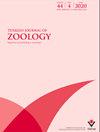土耳其不同湖泊类型对Chironomus spp.(双翅目)分布的影响及水框架指令可选因素的争论
IF 1.7
4区 生物学
Q2 ZOOLOGY
引用次数: 0
摘要
本文章由计算机程序翻译,如有差异,请以英文原文为准。
The effects of various lake typologies on the distribution of Chironomus spp. (Diptera), and arguments on optional factors of Water Framework Directive in Turkiye
: Countries with heterogeneous climatic and geographic characteristics may find it challenging and limiting to fulfill the requirements of the Water Framework Directive (WFD), such as defining ecoregion and water body types. To overcome this limitation, they implement optional factors in addition to the obligatory factors defined in the WFD. As a candidate country, Türkiye is required to comply with the WFD requirements and must determine its own optional and obligatory factors. In this context, we addressed the relevance of Chironomus spp. in determining these factors. We used twenty distinct national lake typologies for Türkiye and identified a total of 24 Chironomus species. The Chironomus genus was found to be effective in determining the optional factors. Statistical analyses revealed that fetch, altitude, salinity, water temperature, pH, saturated and dissolved oxygen, conductivity, orthophosphate, ferrous ion, chloride, and nitrogen compounds were significant in discriminating the regions. The canonical correspondence analysis (CCA) explained 56.62% of the variance. We also statistically analyzed the effectiveness of the class boundaries of the obligatory factors used in Türkiye for regionalization. Among the official obligatory factors, only the altitude boundaries gave a significant result and explained a total of 62% variance. We recommend revising the class boundaries of obligatory factors and using fetch data as a significant genuine parameter for lake typology as an optional factor
求助全文
通过发布文献求助,成功后即可免费获取论文全文。
去求助
来源期刊

Turkish Journal of Zoology
ZOOLOGY-
CiteScore
2.30
自引率
10.00%
发文量
24
审稿时长
6-12 weeks
期刊介绍:
The Turkish Journal of Zoology is published electronically 6 times a year by the Scientific and Technological Research Council of Turkey (TÜBİTAK).
-Accepts English-language manuscripts in various fields of zoology including systematics, developmental biology, behaviour biology, animal models, molecular biology and molecular phylogeny, genomics, physiology (cell communication and signaling systems), biochemistry and immunohistochemistry, applied parasitology and pathology, nanobiotechnology, ecology, evolution, and paleontology of animal taxa.
-Contribution is open to researchers of all nationalities.
-Short communications are also welcome, such as reports of a preliminary nature or those including new records from specific localities or regions, and the editor reserves the right to decide that a paper be treated as a short communication.
-The papers that deal with purely checklists, new host and non-regional new locality records will not be consider for publication.
-Letters to the editor reflect the opinions of other researchers on the articles published in the journal. The editor may also invite review articles concerning recent developments in particular areas of interest.
 求助内容:
求助内容: 应助结果提醒方式:
应助结果提醒方式:


